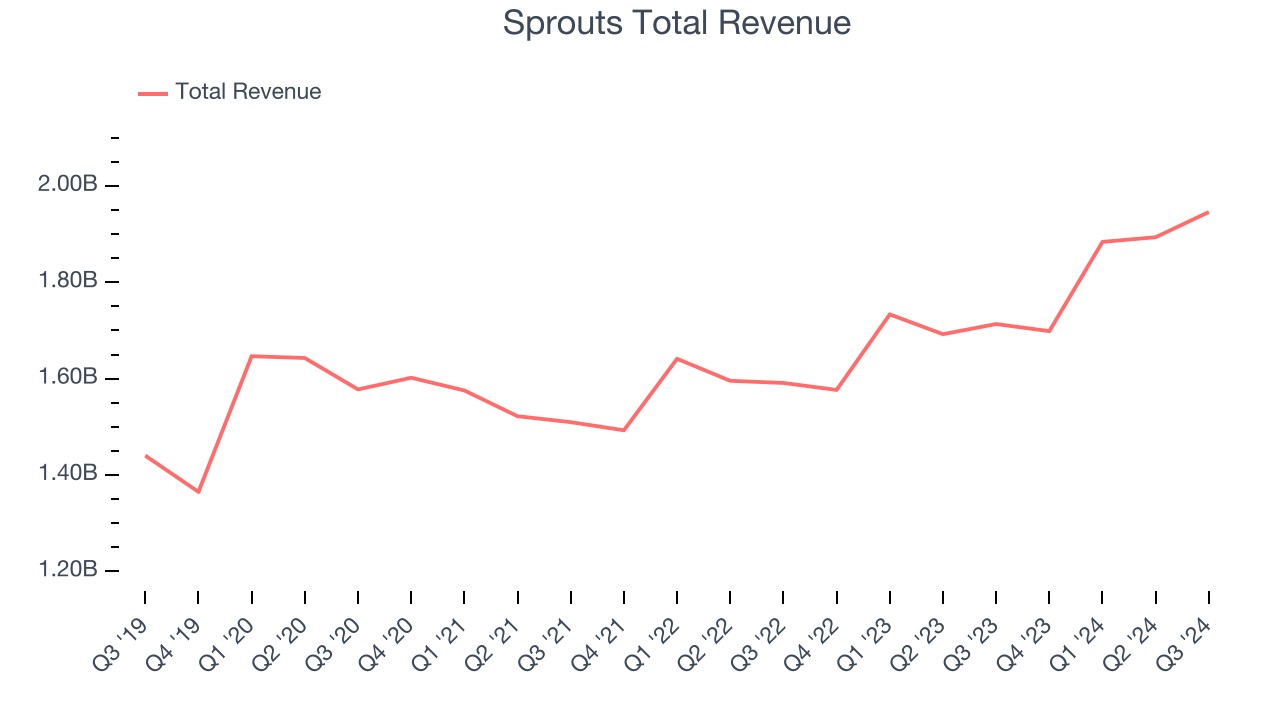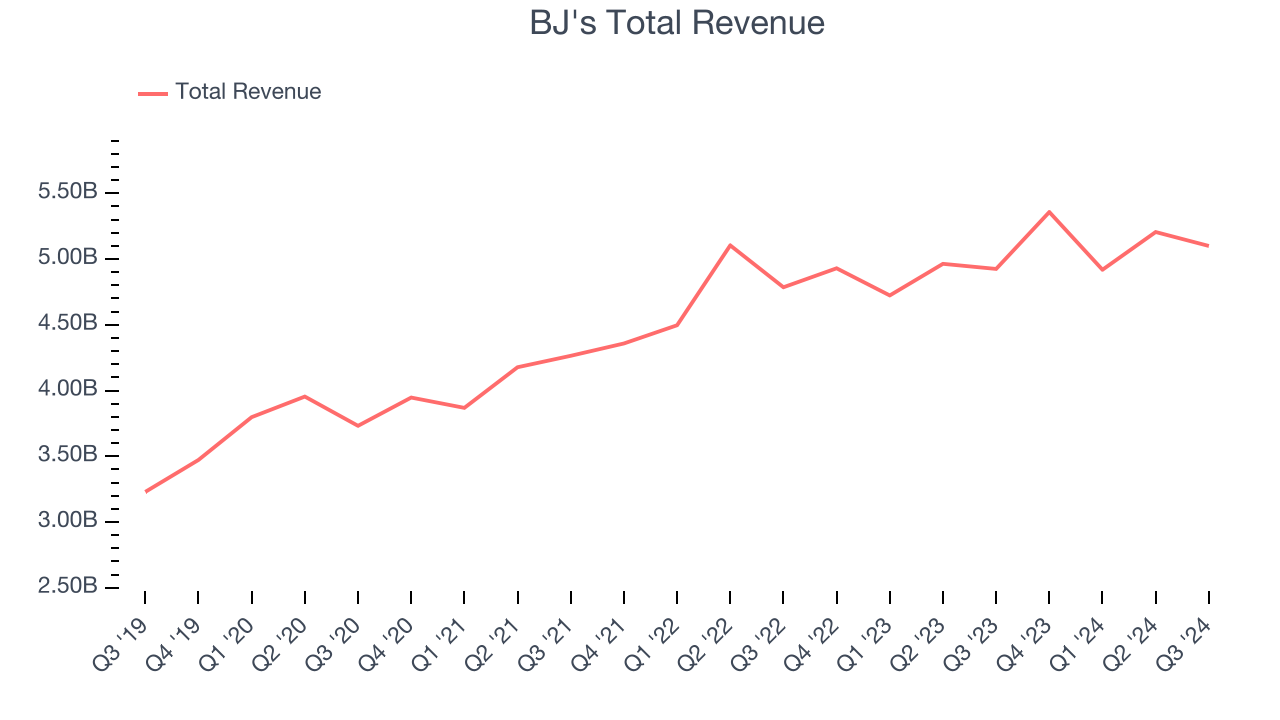
Quarterly earnings results are a good time to check in on a company’s progress, especially compared to its peers in the same sector. Today we are looking at Sprouts (NASDAQ: SFM) and the best and worst performers in the non-discretionary retail industry.
Food is non-discretionary because it's essential for life (maybe not those Oreos?), so consumers naturally need a place to buy it. Selling food is a notoriously tough business, however, as the costs of procuring and transporting oftentimes perishable products and operating stores fit to sell those products can be high. Competition is also fierce because the alternatives are numerous. While online competition threatens all of retail, grocery is one of the least penetrated because of the nature of the product. Still, we could be one startup or innovation away from a paradigm shift.
The 8 non-discretionary retail stocks we track reported a mixed Q3. As a group, revenues beat analysts’ consensus estimates by 0.8% while next quarter’s revenue guidance was in line.
Thankfully, share prices of the companies have been resilient as they are up 9.4% on average since the latest earnings results.
Best Q3: Sprouts (NASDAQ: SFM)
Playing on the secular trend of healthier living, Sprouts Farmers Market (NASDAQ: SFM) is a grocery store chain emphasizing natural and organic products.
Sprouts reported revenues of $1.95 billion, up 13.6% year on year. This print exceeded analysts’ expectations by 3.7%. Overall, it was a stunning quarter for the company with EPS guidance for next quarter exceeding analysts’ expectations and an impressive beat of analysts’ EBITDA estimates.
"The third quarter was another exceptional performance by our Sprouts team," said Jack Sinclair, chief executive officer of Sprouts Farmers Market.

Sprouts scored the biggest analyst estimates beat and fastest revenue growth of the whole group. Unsurprisingly, the stock is up 28% since reporting and currently trades at $152.11.
We think Sprouts is a good business, but is it a buy today? Read our full report here, it’s free.
BJ's (NYSE: BJ)
Appealing to the budget-conscious individual shopping for a household, BJ’s Wholesale Club (NYSE: BJ) is a membership-only retail chain that sells groceries, appliances, electronics, and household items, often in bulk quantities.
BJ's reported revenues of $5.10 billion, up 3.5% year on year, in line with analysts’ expectations. The business had a strong quarter with a solid beat of analysts’ EBITDA and EPS estimates.

The market seems happy with the results as the stock is up 12.1% since reporting. It currently trades at $96.
Is now the time to buy BJ's? Access our full analysis of the earnings results here, it’s free.
Weakest Q3: Target (NYSE: TGT)
With a higher focus on style and aesthetics compared to other large general merchandise retailers, Target (NYSE: TGT) serves the suburban consumer who is looking for a wide range of products under one roof.
Target reported revenues of $25.67 billion, up 1.1% year on year, falling short of analysts’ expectations by 0.9%. It was a disappointing quarter as it posted full-year EPS guidance missing analysts’ expectations.
Target delivered the weakest performance against analyst estimates in the group. As expected, the stock is down 17.1% since the results and currently trades at $129.34.
Read our full analysis of Target’s results here.
Grocery Outlet (NASDAQ: GO)
Due to its differentiated procurement and buying approach, Grocery Outlet (NASDAQ: GO) is a discount grocery store chain that offers substantial discounts on name-brand products.
Grocery Outlet reported revenues of $1.11 billion, up 10.4% year on year. This number met analysts’ expectations. Taking a step back, it was a mixed quarter as it also produced a decent beat of analysts’ EBITDA estimates but full-year EBITDA guidance missing analysts’ expectations.
Grocery Outlet had the weakest full-year guidance update among its peers. The stock is up 29.8% since reporting and currently trades at $18.92.
Read our full, actionable report on Grocery Outlet here, it’s free.
Dollar Tree (NASDAQ: DLTR)
A treasure hunt because there’s no guarantee of consistent product selection, Dollar Tree (NASDAQ: DLTR) is a discount retailer that sells general merchandise and select packaged food at extremely low prices.
Dollar Tree reported revenues of $7.57 billion, up 3.5% year on year. This number surpassed analysts’ expectations by 1.7%. More broadly, it was a mixed quarter as it also produced a narrow beat of analysts’ gross margin estimates but EPS guidance for next quarter missing analysts’ expectations.
Dollar Tree scored the highest full-year guidance raise among its peers. The stock is down 1% since reporting and currently trades at $71.77.
Read our full, actionable report on Dollar Tree here, it’s free.
Market Update
Thanks to the Fed's series of rate hikes in 2022 and 2023, inflation has cooled significantly from its post-pandemic highs, drawing closer to the 2% goal. This disinflation has occurred without severely impacting economic growth, suggesting the success of a soft landing. The stock market has thrived in 2024, spurred by recent rate cuts (0.5% in September and 0.25% in November), and a notable surge followed Donald Trump’s presidential election win in November, propelling indices to historic highs. Nonetheless, the outlook for 2025 remains clouded by potential trade policy changes and corporate tax discussions, which could impact business confidence and growth. The path forward holds both optimism and caution as new policies take shape.
Want to invest in winners with rock-solid fundamentals? Check out our Top 5 Quality Compounder Stocks and add them to your watchlist. These companies are poised for growth regardless of the political or macroeconomic climate.
Join Paid Stock Investor Research
Help us make StockStory more helpful to investors like yourself. Join our paid user research session and receive a $50 Amazon gift card for your opinions. Sign up here.



